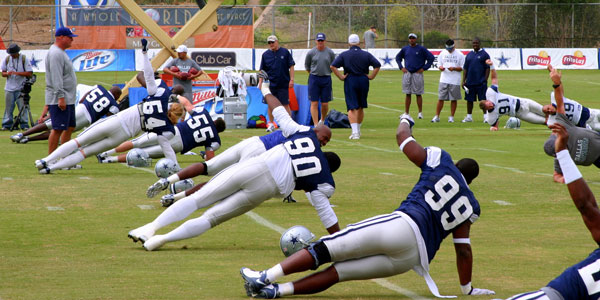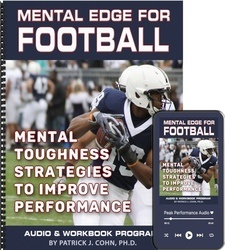
How Do You Define Confidence?
Self-confidence is defined as the belief in you ability to execute your football skills in games. Unfortunately, confidence can be fragile for many athletes–meaning it can up and down with every play.
Mistakes can lead to slight doubts and these doubts undermine your self-confidence. Bad players, bad games, can cause athletes to doubt over the long-term and possibly enter a slump.
Thus, it helps to know what impacts your confidence–what I call the confidence-killers. And one key to gaining confidence is managing the things that hurt your confidence.
Many factors contribute to an athlete’s confidence, such as:
- Finding and relying on your strengths
- Preparing effectively at a high level
- Focusing on the small successes
- Managing unrealistic expectations
- Working hard in practice
- Developing strong mental skills
- Improving technique or form
- Ignoring undue or excessive criticism
- Using mental preparation routines
- Managing the challenges associated with perfectionism
- Not allowing mistakes to hurt confidence
- Avoiding comparisons to other athletes
You improve confidence by focusing on what you can control, such as your practice and work ethic to improve. In addition, you have to address the confidence killers that undermine your confidence.
San Francisco 49ers head coach Kyle Shanahan said that winning can lead to confidence, but more factors are at play for ball players.
“The more games you win, the more confidence guys get. Just like the more games you lose in a row, the less confident you get. Both can be a little bit contagious to the team and I think our guys, we’ve won a lot of different ways. Been in a lot of different types of games and I think our guys, the more you do that, the more you can reassure yourself that you can pull out certain types of wins.”
Do you have to wait to win to feel confident? Winning cannot be the only source of confidence. If so, how to feel confident without winning first?
Building confidence means focusing on the small things you do well, such as diligent practice, mental preparation for games, improving your mental skills, doing the extra work, Being a good teammate, working to improve weaknesses, and pushing past comfort zone.
Improving confidence for a football player can be from working on speed and agility, getting in extra reps, controlling your focus, etc.
Most football players think bigger about confidence: a winning season, get to states, or a championship game. But football confidence can come from many smaller sources, such as the shoes you wear that feel right or positive comments from others.
How to Improve Football Confidence
Look for opportunities to feel confident based on your past success, practice, and belief in your physical ability. Ask yourself each day, “Why do I deserve to feel confident today?”
Focus on the sources of confidence you can control, such as belief in your skills, effective practice, putting in the extra reps after practice, and years of experience playing the game of football.
Be aware of what can hurt your confidence–the confidence killers, such as high expectations, self-doubt, making comparisons to other ball players who you think are better than you, and paying too much attention to what others might think about your game.
Related Sports Psychology Articles
*Subscribe to The Sports Psychology Podcast on iTunes
*Subscribe to The Sports Psychology Podcast on Spotify
Download a free sports psychology report to improve your mental game!
Learn more about our one-on-one mental game coaching.
The Mental Edge for Football

Are you (or your athletes) performing inconsistently in games with less confidence in games than in practice? Do you lose confidence easily after a couple of blown plays? Do you become so frustrated with your game that you can’t focus on the next play? If you answered yes to these questions, it’s a good bet that your mental game might prevent you from consistent performance in games.
“The Mental Edge For Football” is a complete brain dump of the TOP eight mental training sessions we teach our football players to help them boost their mental game and improve consistency – from how to mentally prepare for games to performing under pressure to building unstoppable confidence.